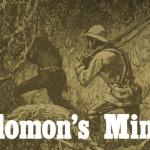Posted At: Mar 03, 2025 - 975 Views

Introduction
The hero archetype is central to world mythology, representing strength, wisdom, leadership, and personal transformation. Heroes like Jason, Gilgamesh, King Arthur, and King Solomon share common heroic traits, yet their motivations, challenges, and legacies differ.
This discussion explores:
🔹 Jason vs. Gilgamesh – A contrast between external ambition and internal self-discovery.
🔹 King Arthur vs. King Solomon – A study of heroism in battle vs. wisdom in governance.
🚀 Download the Full Discussion (PDF): Click Here
1. Jason vs. Gilgamesh: External vs. Internal Heroic Journeys
📌 Key Insight: Jason’s heroism is defined by his quest for power, while Gilgamesh’s journey is one of self-reflection.
🔹 Jason’s Quest for the Golden Fleece (Greek Mythology)
✔ Seeks political legitimacy by reclaiming his throne.
✔ Receives guidance from Aphrodite and Medea, the latter becoming a tragic figure in his story.
✔ His downfall is human-driven, resulting from betrayal and poor decisions.
🔹 Gilgamesh’s Quest for Immortality (Mesopotamian Mythology)
✔ Motivated by fear of death after losing his friend Enkidu.
✔ Encounters divine figures like Saduri and Utnapishtim, who teach him about life’s impermanence.
✔ Learns that true immortality is achieved through legacy, not eternal life.
💡 Takeaway: Jason’s heroism is external and political, while Gilgamesh’s is introspective and philosophical.
2. King Arthur vs. King Solomon: Heroism in War vs. Wisdom
📌 Key Insight: Arthur embodies the warrior-king, while Solomon represents wisdom and moral leadership.
🔹 King Arthur: The Chivalric Leader of Camelot
✔ A medieval icon known for valor, justice, and leadership.
✔ His knights pursue quests for divine relics like the Holy Grail and Excalibur.
✔ Despite his strengths, Camelot falls due to betrayal and internal conflicts.
🔹 King Solomon: The Wise Ruler of Israel
✔ Renowned for wisdom, diplomacy, and wealth.
✔ Famous for the Judgment of Solomon, demonstrating his ability to resolve disputes fairly.
✔ His reign is marked by peace and prosperity, but later declines due to moral failings.
💡 Takeaway: Arthur’s heroism is defined by war and legend, while Solomon’s is rooted in wisdom and justice.
3. The Role of Heroic Archetypes in Cultural Narratives
✔ Greek & Mesopotamian Myths: Heroes face personal and existential dilemmas (e.g., Jason and Gilgamesh).
✔ Medieval & Biblical Traditions: Kings serve as models of leadership and moral lessons (e.g., Arthur and Solomon).
✔ Modern Influence: These archetypes persist in literature, film, and leadership ideals.
💡 Best Practice: Understanding hero myths deepens our insight into historical values, leadership, and moral dilemmas.
Conclusion
Jason, Gilgamesh, King Arthur, and King Solomon each represent different aspects of heroism—political ambition, existential reflection, chivalric duty, and wisdom. Their stories continue to shape cultural perceptions of leadership, bravery, and morality.
📥 Download Full Discussion (PDF): Click Here
Related Mythology & Literature Resources 📚
🔹 The Hero’s Journey: Common Archetypes in World Mythology
🔹 Warrior-Kings vs. Philosopher-Rulers: A Comparative Study
🔹 Epic Quests in Literature: From Gilgamesh to King Arthur
📌 Need expert insights on mythology and heroic archetypes? 🚀 Our professional writers at Highlander Writers can assist with comparative mythology, folklore research, and literature analysis!
Leave a comment
Your email address will not be published. Required fields are marked *










